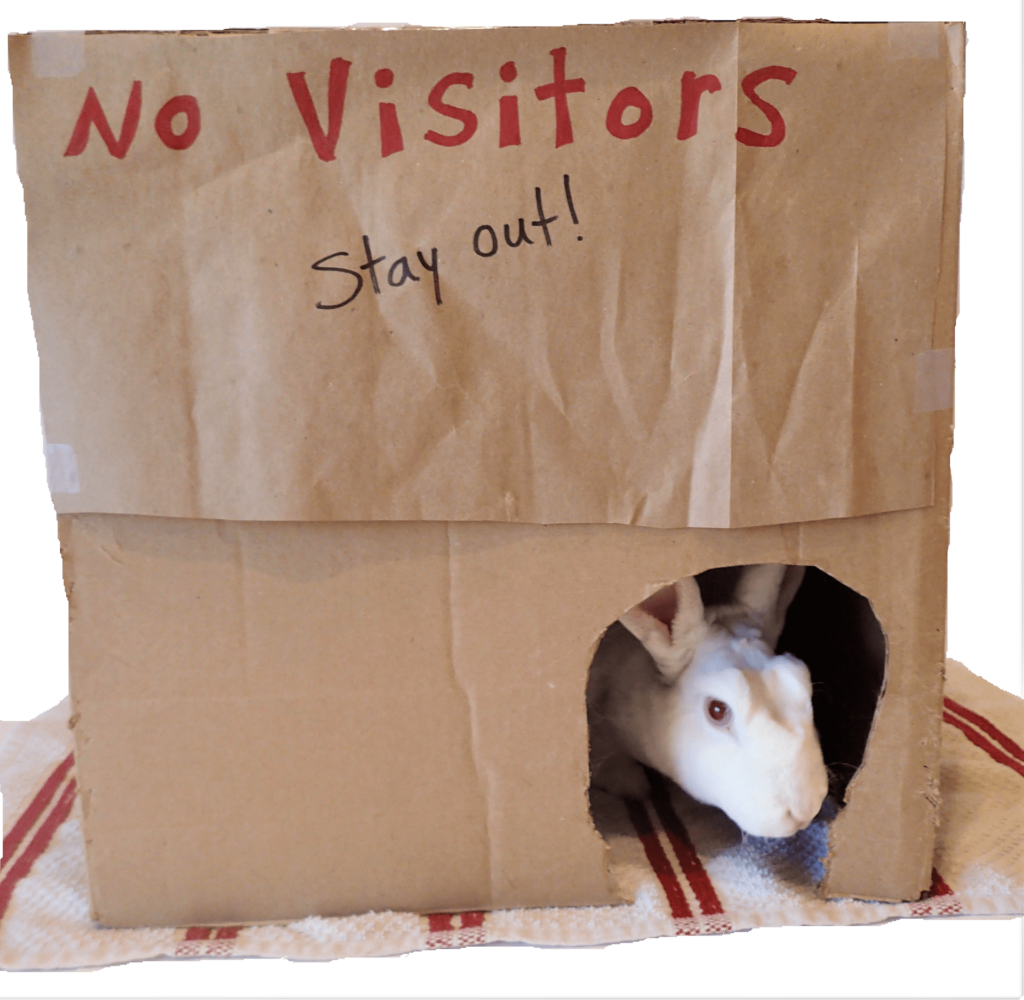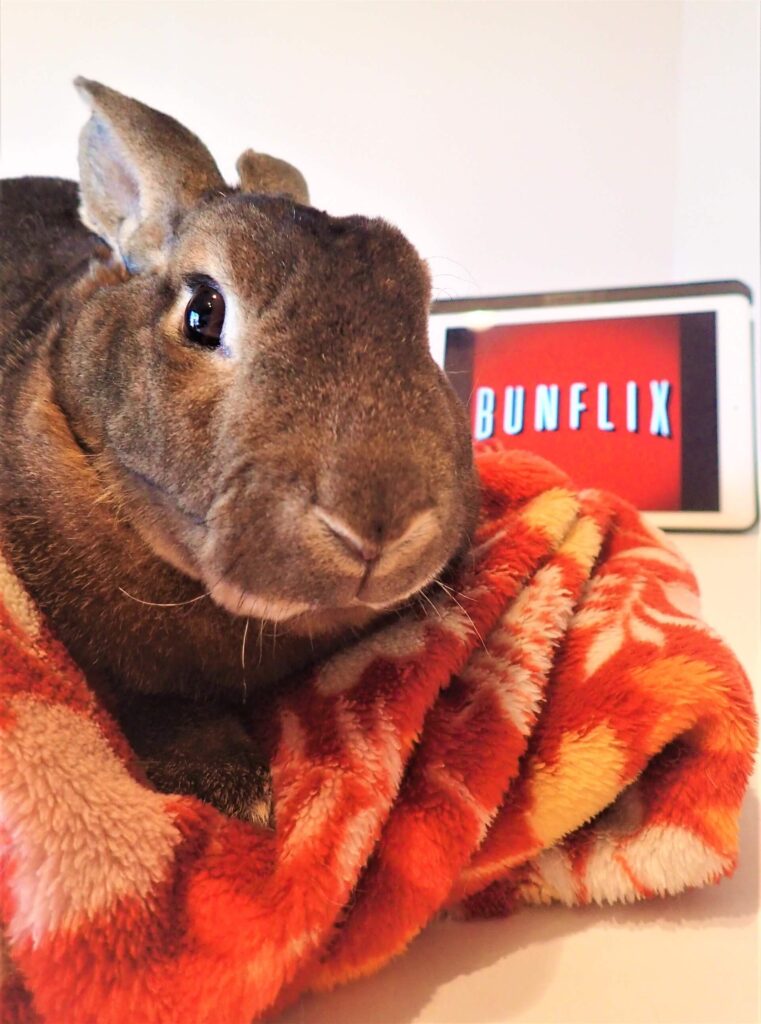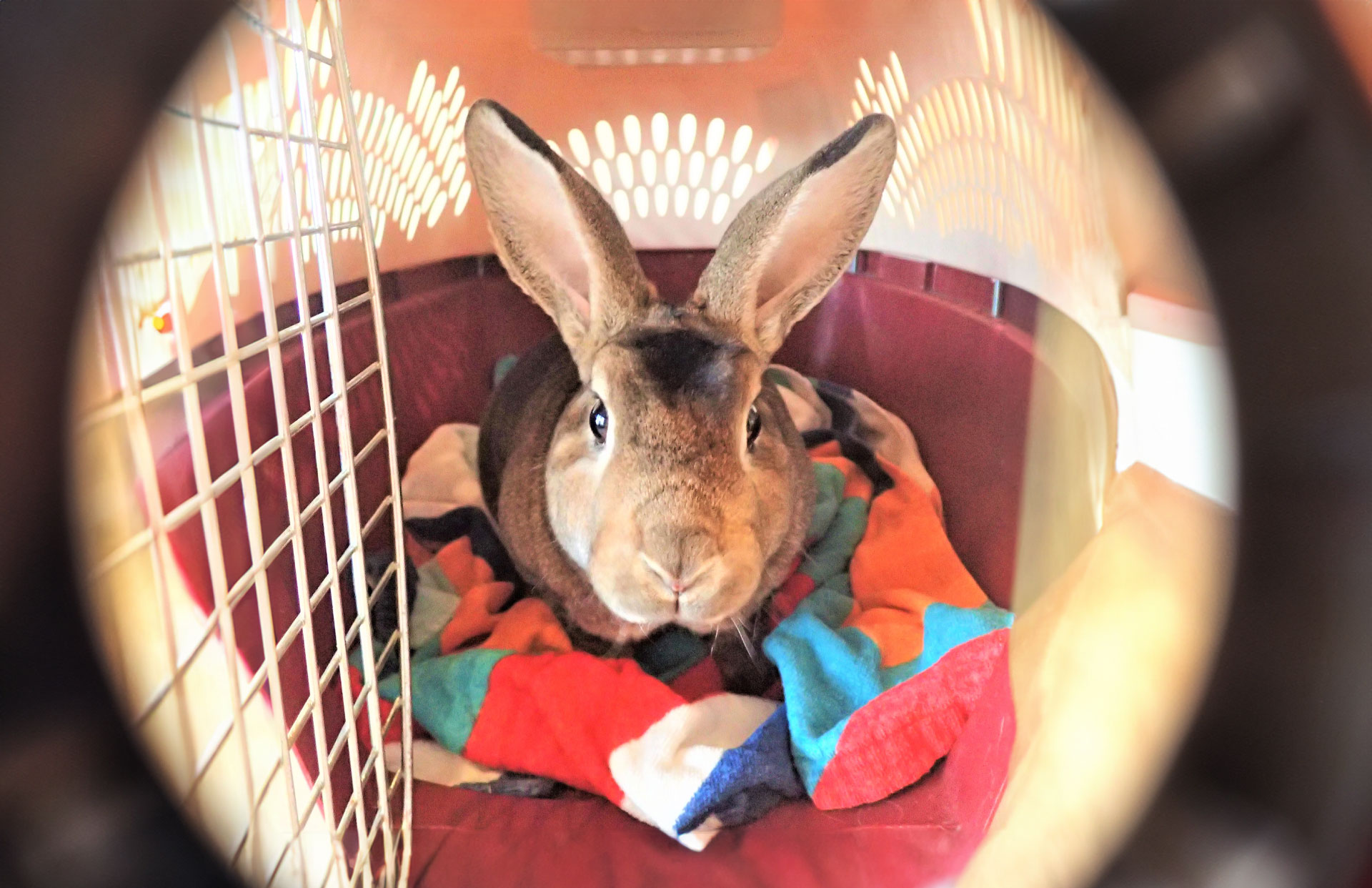Leaving my rabbits Reese and Mindy with a sitter has always made me a bit uneasy. I worried about disrupting my bunnies’ routines. I worried they would miss me. I also worried about their well-being in general. Now, with the two Rabbit Hemorrhagic Disease Virus outbreaks (RHDV1 and RHDV2) and the COVID-19 pandemic, the whole environment of rabbit care has shifted. I have a new set of criteria to make sure my bunnies stay safe and healthy when I can’t be with them.
My options for temporary care have changed. Before the outbreaks, I either boarded Reese and Mindy with a veterinarian, hired a rabbit sitting service, or relied on friends and family to care for them. The following is a look at each option and their risks during these uncertain times.

Boarding with a Shelter or Rescue
Boarding with a shelter is an unlikely option today. Emergency guidelines during the RHDV outbreaks advise shelters and rabbit rescue groups to suspend their boarding, grooming, and in-person rabbit introductions, especially if they are located in outbreak states. The virus travels from rabbit to rabbit via feces, urine, and bodily secretions, and can be spread to them by people, other animals (such as cats and dogs), and even insects, so housing rabbits from different locations near each other is no longer safe.
In fact, House Rabbit Society recommends I provide care for my buns in a place where they are the only rabbits present, if possible. Because the disease is so contagious and usually fatal, if one rabbit passes away at a facility, the State Veterinarian’s office could require that all the rabbits in that facility are euthanized. That is not a risk I’m willing to take!
In my search for a sitter for Reese and Mindy, I’ll avoid shelters and rescues. Instead, I’ll let them focus on emergency treatment for rabbits who don’t have caregivers.
Boarding with a Veterinarian
I absolutely love my local veterinarian. When a previous rabbit of mine started to show his age as a senior rabbit, I turned to my veterinarian’s office for boarding in case they needed medical attention while I was gone. Although I still trust my vet for health care, there are a few reasons why boarding with her office is no longer the best option.
As mentioned above, the safest option for sitting is a place where my rabbits will be the only rabbits in the building. Even if Reese and Mindy are the only rabbits scheduled for boarding, there is always a chance another rabbit will need to come to the vet’s office for care or boarding. Dogs and cats can also transmit RHDV to rabbits, and there’s also no guarantee they won’t be in the boarding area as well.
Fortunately, there are safety guidelines to help veterinarians combat the RHDV outbreak. I hope that in the future I can return to boarding Reese and Mindy with their wonderful, caring veterinarian. At the moment, though, it’s not the best option for any of us.

Boarding in a Private Home
In the past, I used the House Rabbit Society’s awesome network of rabbit caretakers to find a sitting buddy. We would take turns sitting for each other, and our rabbits got along very well. Unfortunately, RHDV and COVID-19 have changed this, too. I wouldn’t want to put any other rabbits at risk, or put Reese and Mindy at risk, by exposing the rabbits to each other. Additionally, I want to follow COVID-19 safety protocols like social distancing and avoiding contact with others after I travel.
Of course, there are sitters who might be willing to take in Reese and Mindy as the only rabbits in the house. These might include a professional pet-sitter, or a trusted friend or relative. I’ll need to ask the sitter if they have any other animals in the house, though. As mentioned previously, dogs and cats can also transmit RHDV to rabbits. Even humans can transmit the disease without knowing it; our clothes, shoes, and unwashed hands can bring the virus in from the outdoors. I will also need to plan on extra sitting time for self-quarantine after I return from traveling. I’d wait to pick up my rabbits in order to avoid exposing the sitter to COVID-19. Could we arrange a contact-free drop off at my house? Maybe that would be an option the sitter would be open to.
Before I take Reese and Mindy to someone else’s home, I’ll need to ask a few questions. Will there be other animals in the house? Would you be willing to wash your hands before and after handing the rabbits and any food? Would you be willing to take off your shoes when you come into the house and possibly change clothes before and after handling the rabbits? Yikes. That’s pretty personal. Unfortunately, it’s a necessary conversation.
Rabbitsitting in Your Home
Of all the options, I like this one best. In my own home, I know Reese and Mindy will be the only animals present. I can ask someone I know and trust, like a friend or family member, to come by to care for them. I’d feel less awkward asking someone to remove their shoes when they come into my house (instead of asking them to take off their shoes in their own house). Of course, we’ll still need to talk about RHDV, in addition to the usual conversation about rabbit care, food, emergency vet care, and safe handling. As a final benefit, with this option, I would be able to self-quarantine after traveling and already have my buns home with me.
People are taking precautions during the COVID-19 pandemic. We disinfect, avoid areas crowded with other people, and stay in our homes as much as we can. But when travel is absolutely necessary, we can take special precautions to make the trip safer. Many of the same practices are necessary for rabbits during the RHDV outbreaks. If I can keep Reese and Mindy in my home, and keep my home safe from RHDV, I will feel better about traveling when I must.
Learn more about RHDV: houserabbit.org/rhdv
Reviewed by HRS staff
Author: Christine LaytonPhoto Credit: Christine Layton
Journal Issue: House Rabbit Journal, Winter 2020




